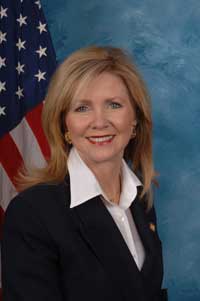Legislative Report: Healthcare Reform
Before Thanksgiving, H.R. 3200 and the Baucus Bill will reach the floor of the House and Senate, respectively, where they will be vigorously debated and are ultimately likely to pass.
by Marsha Blackburn* | print pdf version |
October 15, 2009
The healthcare reform debate has drawn out well beyond the President's goal of having a bill on his desk this summer. The most educational part of the discussion seems to have occurred after my colleagues and I left the plush chambers of the House and listened to real Americans in town hall meetings back home.
There is universal agreement that our healthcare system is in need of reform. Coverage needs to be both portable and affordable. Bans on pre-existing conditions must be addressed, and insurance companies should make good on the policies they sell. These are the symptoms that we agree on. Where liberals and the public disagree is on the cure.
My constituents told me clearly that as frustrated as they are with insurance company bureaucracies, they don't want to replace them with more government bureaucracy. Tennesseans know from our experience with TennCare that however well meaning, too much government intervention into the healthcare system can reduce access to care while driving up costs.
Over the years, states as different as Tennessee and Massachusetts have all attempted to expand coverage and decrease healthcare costs by creating new government programs. Ironically, those programs have driven up costs and driven people out of the market. I don't want to see the mistakes of the TennCare era repeated on a national scale.
As of this writing, there are two primary pieces of legislation that will reform healthcare. Rep. Henry Waxman, Chairman of the House Energy and Commerce Committee has sponsored H.R. 3200. Senator Max Baucus, Chairman of the Senate Finance Committee, has proposed a rival piece of legislation as have various other Senators. Neither bill addresses healthcare reform according to the guidelines the President has advocated.
Republican arguments against the big government solutions that are fighting their way to the President's desk are met by incredulous Democrats who accuse us of not offering any solutions of our own. In fact, many of my conservative colleagues have proposed legislation that would address the same issues of portability, accessibility, and cost, but without the imposition of a massive, new government bureaucracy. Instead, they use free market principles to encourage innovation while driving the price of healthcare down.
Congressman John Shadegg wrote a bill that will make it easier for Americans to buy and keep health insurance from sources other than their jobs. Under the bill, you would get a tax credit to purchase insurance from your employer, church, or local civic club. You could take that policy with you from job to job or state to state. Insurance companies would be better equipped to form risk pools and cover people with chronic or pre-existing conditions affordably. Rep. Shadegg introduced his bill on the same day that Chairman Waxman introduced H.R. 3200. I am proud to say that I am a cosponsor of it.
The Republican Study Committee also introduced healthcare reform legislation that is very similar to the bill introduced by Rep. Shadegg. It also includes a number of other provisions, including one that I have long advocated that would help seniors choose when to go into Medicare instead of mandating it.
Finally, Congressman Mike Rogers of Michigan has sponsored a very creative piece of legislation. His bill was inspired by the President's address to Congress in September. Congressman Rogers looked at the President's speech from a free-market perspective. He found ways to meet most of the President's goals without creating new government agencies. Congressman Rogers and I originally introduced this bill as an amendment to HR 3200. Not surprisingly, Democrats on the Energy and Commerce Committee would not allow it to come to a vote. Now we hope that it will have a better chance as a stand-alone bill.
Before Thanksgiving, H.R. 3200 and the Baucus Bill will reach the floor of the House and Senate, respectively. They will be vigorously debated and are ultimately likely to pass. Upon passage, these vastly different bills will go to a conference committee where, behind closed doors, the real healthcare bill will be written. Between now and then, conservatives in Washington have to step up our efforts to make sure that common sense reform people want isn't overtaken by a big government solution that won't work for anyone.
* Marsha Blackburn represents Tennessee's 7th district in the U.S. House of Representatives.
